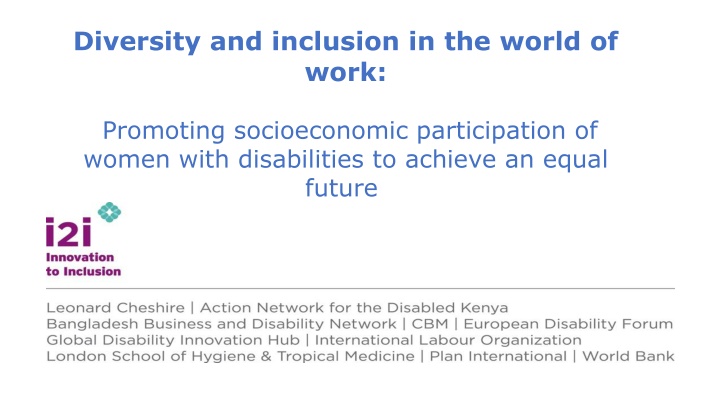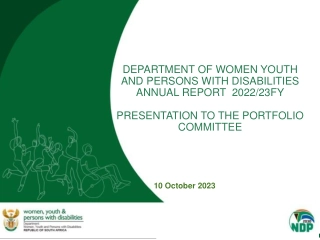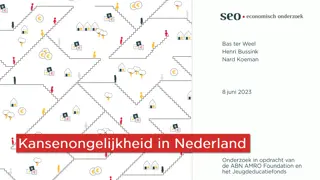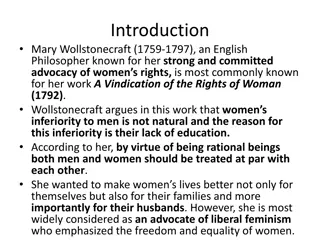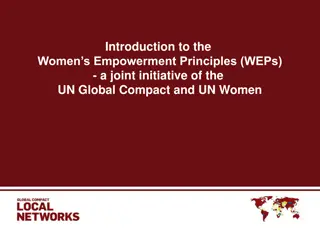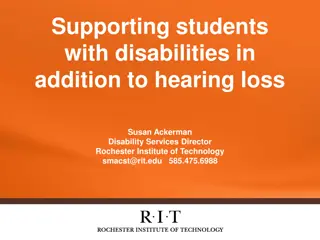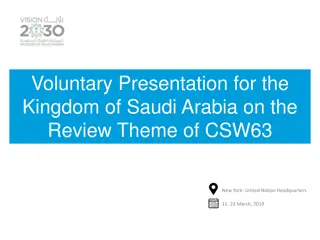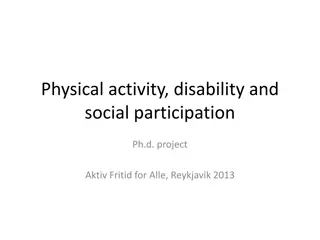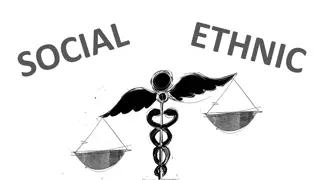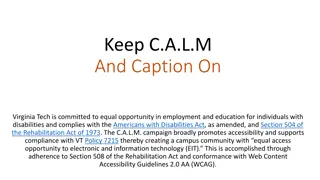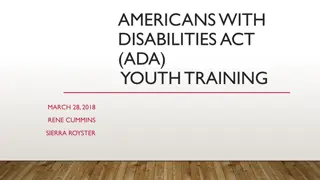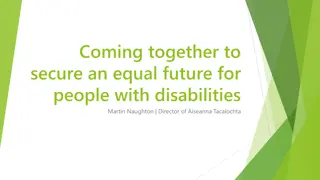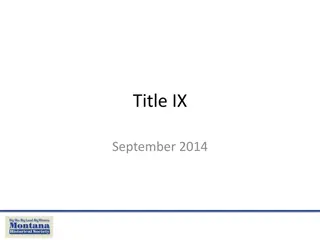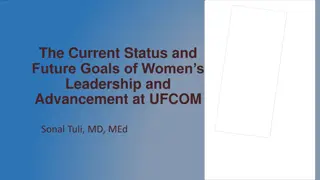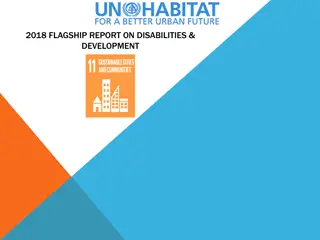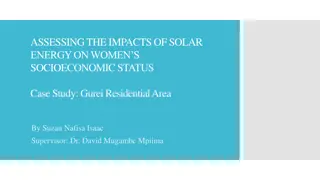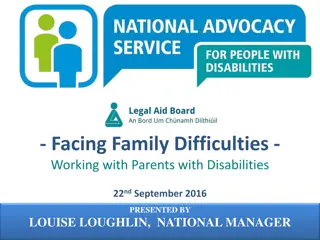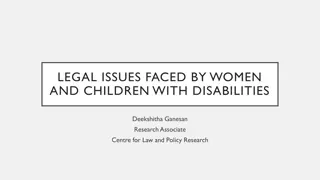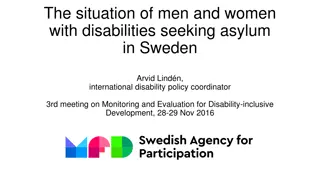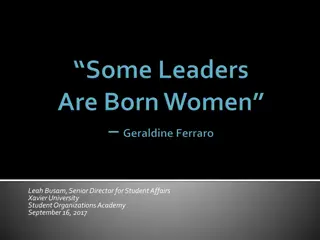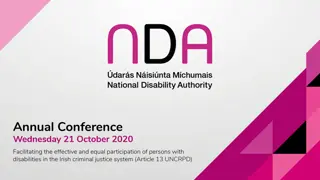Promoting Socioeconomic Participation of Women with Disabilities for an Equal Future
In the world of work, diversity and inclusion play crucial roles in promoting socioeconomic participation of women with disabilities to achieve an equal future. This webinar focuses on understanding the gender dynamics, power relations, and barriers faced by women and men with disabilities in economic participation. Gender analysis is conducted to uncover patterns of access, decision-making, leadership, roles, responsibilities, social capital, networks, safety, and risk. Various stakeholders are engaged to collect data and address intersecting forms of discrimination faced by women and girls with disabilities. The goal is to empower individuals with disabilities and create a more inclusive work environment.
Download Presentation

Please find below an Image/Link to download the presentation.
The content on the website is provided AS IS for your information and personal use only. It may not be sold, licensed, or shared on other websites without obtaining consent from the author.If you encounter any issues during the download, it is possible that the publisher has removed the file from their server.
You are allowed to download the files provided on this website for personal or commercial use, subject to the condition that they are used lawfully. All files are the property of their respective owners.
The content on the website is provided AS IS for your information and personal use only. It may not be sold, licensed, or shared on other websites without obtaining consent from the author.
E N D
Presentation Transcript
Diversity and inclusion in the world of work: Diversity and inclusion in the world of work: Diversity and inclusion in the world of work: Promoting socioeconomic participation of women with disabilities to achieve an equal future
Housekeeping and logistics Sign Language Interpretation and Captioning available (captioning link in chatbox) On your screen: sign language interpreter and presentation slides All attendees are muted You can still ask questions o For technical issues use chat box o For content questions use question box you can already start sending questions and we aim to answer everything at the end. o We would be happy to see who you are and from which organisations you are joining from, feel free to share in the chatbox o Accessible recording of webinar and transcript will be available o Thank you for the interpreters and captioner
Ariana Almeida Ariana Almeida, Women s Economic Empowerment Specialist (Innovation International UK to Inclusion), Plan Ariana is a social entrepreneur with a multi-sector background and 13+ years experience working to fight inequality in Europe, USA, Central and South-East Asia and Africa, with a focus on gender equality, economic empowerment and inclusion. The diversity of her experience brings a unique combination of practical and operational perspectives implementation of policies and projects. to the discussion and
Gender in i2i Persons with disabilities face intersecting forms of discrimination; women and girls with disabilities are more likely to face discrimination and exclusion, compared to men and boys with disabilities.
Gender Analysis Purpose and Process Understand the gender dynamics, power relations, and gender and disability-specific barriers faced by women and men with disabilities in their economic participation. Areas of analysis: Gendered patterns of access and control of economic assets and services Participation, decision- making and leadership Gendered roles & responsibilities Access to other assets and services Social capital and access to networks Safety and risk
Gender Analysis Data collection Extensive literature review and secondary data analysis. Primary data collection with a total of 113 stakeholders engaged across both target countries: 63 persons with disabilities (47% female respondents) 25 caregivers (51% female) 26 other stakeholders from OPDs and community champions, private sector, Government TVETS and
Gender Analysis Findings Gender roles and responsibilities Economic participation & access to work in private sector Mobility Access to information Education and training Social capital and access to networks Decision making GBV against women with disabilities
Gender roles & responsibilities Patriarchal attitudes and discriminatory stereotypes Time poverty - women with disabilities have a higher burden of care Engaging in training and workforce requires challenging balance with families As one employed woman with disability in Bangladesh shared, due to our family role (considering all the cooking, care work, reproductive role) we are not encouraged to take more responsibilities because we are overwhelmed to balance this role and expectations from family and society
Mobility One visually-impaired unemployed woman respondent in Bangladesh shared that, in her experience, Women with disabilities face more challenges/barriers. We are not safe in and out of home and so we have mobility issues. Even my husband who is trying to provide support sometimes misunderstands me. In case of going outside, or walking down the road, it is very complex for me to understand if people will be supportive or not. Many people deliberately push me. Poor road & transport infrastructure Unsafe, inaccessible and unaffordable public transports Discriminatory gender norms restrict women s mobility & freedom to safely access public spaces Mobility to and from work identified as key challenge
Access to information Women with disabilities access and use less technology than men with disabilities Low computer skills, difficulty in accessing cyber cafes and lack of money for internet were key barriers for women with disabilities Information on job vacancies in newspapers, friends, relatives, family and OPD members
Education and Training Women with disabilities have unequal access to education and training Going against prevailing customs and challenge gender roles may result in backlash from family and community
Social capital and access to networks Social norms, limited mobility, worries with safety in public places limit engagement in activism In Bangladesh male respondents were more aware and engaged In Kenya awareness of OPDs and other networks is limited and membership of persons with disabilities is negligible
Decision Making Women in both countries are underrepresented in decision making level and excluded from critical discussions this is exacerbated for women with disabilities In Kenya persons with disabilities, particularly unmarried and less educated appear excluded from critical household decisions
Gender based violence A woman with a disability in Bangladesh told us that before I had no problem with working, but after getting married working is affecting my relationship. My husband is always complaining that I am not performing my family role and household activities as per his requirements Gender-based violence is pervasive and prevalent among women with disabilities Domestic violence as a barrier and potential consequence Women with and without disabilities often face discrimination, harassment in the workplace and on the way to and from work
Economic participation of women and men with disabilities Sectors of employment Low employment of persons with disabilities Low self- confidence & self-esteem Younger & educated respondents with higher confidence Women with disabilities have less knowledge about the job market & career opportunities Government work or self- employment considered best suited Stigma & discrimination prevail Families often unsupportive Negative perception and attitudes of recruiters, co- workers and costumers Women with disabilities negatively affected by double burden of gender and disability Employers with conscious & unconscious bias Limited access to leadership positions. Recruitment Perception of others Self perception Retention and progression Clear policies &commitment from companies to inclusion enables women and men to meaningfully participate in the world of work Employment in lower-wage jobs Limited networks to reach candidates with disabilities Reports of persons with disabilities being paid less then persons without a disability in the same position In Kenya, high cost of accommodatio n & assistive technologies raised as challenges to the recruitment
Nasrin Jahan Nasrin Jahan, Founder & Executive Director Disabled Child Foundation in Bangladesh @ Nasrin speaks to us both from her own personal experience and from the work she does at the Disabled Child Foundation (DCF). DCF is an Organization of Persons with Disabilities OPD. This non-Government, non-profitable and non-political organization was established in 2005 with the mission of achieving equal rights and opportunities for persons with disabilities in Bangladesh.
Margaret Wairimu Margaret Wairimu, Talent Specialist, Coca-Cola Beverages Africa (Kenya) Margaret Ndei is a Certified Human Resource Professional in Kenya, passionate about Diversity and Inclusion. She believes having a diverse and inclusive workforce requires a collaborative effort. She has seen Coca Cola Beverages Africa Kenya become a member of Kenya Business Disability Network and United Nation Women s Empowerment Principles. Under her leadership, Coca-Cola Beverages Africa (Kenya) won an award of Most Inclusive Global Brands in Kenya in the recent National Diversity and Inclusion Awards and Recognition.
Discussion What works to support women with disabilities to access private sector employment?
THANK YOU! For any questions on the Gender Analysis please contact: Ariana Almeida - Women Economic Empowerment Specialist at Plan International UK (ariana.almeida@plan-uk.org)
